In bamboo shelters, Rohingya women stitch new futures
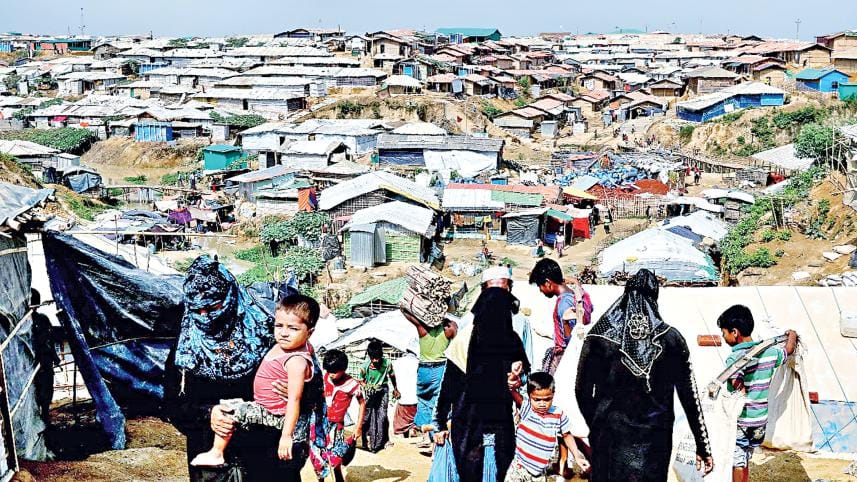
About 34 kilometres southeast of Cox's Bazar, the sprawling Rohingya camps in Ukhiya stretch across hills and valleys, their bamboo walls and tarpaulin roofs forming temporary shelters crowded with people and stories too often left untold.
On a humid afternoon in late June, in Block E of Camp 4, light rain glistened on the brick-paved road. Children raced barefoot through narrow alleys, men gathered around makeshift tea stalls, and chickens wandered freely.
Amid all this movement and life, one presence was strikingly absent -- the women.
Down a narrow alley, the unseen half of the community began to emerge. Inside a modest bamboo-walled room, 15 Rohingya women sat cross-legged on a worn plastic mat, attending a group session led by Rohingya Women Empowerment (RWE), a local NGO. Clad in black burqas, only their eyes visible, they listened intently while toddlers clung to their arms. Eight of them were married -- all as children.
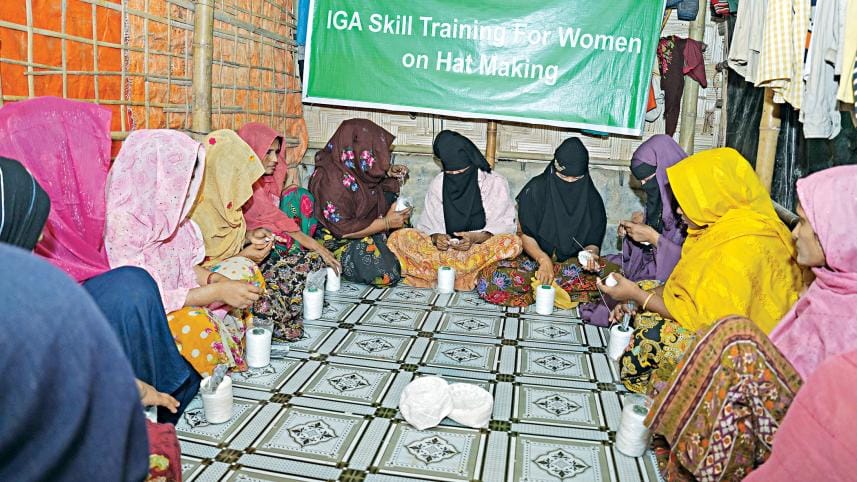
Among them was 21-year-old Asma Bibi, her life shaped by displacement, abandonment and the quiet resilience of single motherhood. "I was married at 16, after coming here," she said. "Two years later, I had my daughter. Then in 2021, my husband left for Malaysia without telling anyone. We never heard from him again."
I've learned so much, but I can't use any of it. I don't have the materials. If I had just a little capital, I could start working -- maybe even earn something.
Nearly four years later, Asma survives on rations from the World Food Programme while raising her daughter alone. "I never got to study," she said. "But I want my daughter to go to school. I want her to have a life, one that's not trapped here like mine."
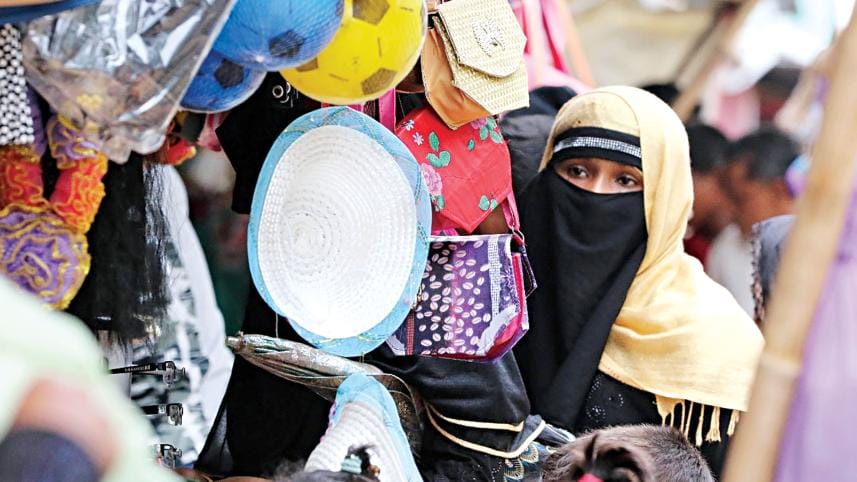
While most women remain confined to their shelters by custom and social restrictions, some like Asma are pushing against the walls. She recently completed training in hand-stitching and hat-making through a women's leadership project run by RWE with support from Bangladesh Nari Pragati Sangha (BNPS), UN Women and the Women's Peace and Humanitarian Fund. But without materials, her skills remain unused.
I always wanted to study. But fate didn't allow it. Still, I want my children to be educated. But in this poverty, even that feels like a distant dream.
"If I had just a little capital, I could start working, maybe even earn something," she said.
Nineteen-year-old Kismat Ara, now pregnant with her third child, was married at 15 and became a mother twice in quick succession. "I always wanted to study. But fate didn't allow it," she said. "Still, I want my children to be educated. But in this poverty, even that feels like a distant dream."
Her husband, an NGO volunteer, earns Tk 8,000 a month -- barely enough for essentials. Kismat trained in food processing and proudly displayed a jar of homemade pickles, but without capital or freedom to move outside the camp, her ambitions remain bottled.
Income is unstable for most camp families. Men take up day labour when available -- fixing roads, clearing drains, repairing shelters.
When work dries up, they fall back on rations.

"When there's no money, small arguments turn into fights," said 25-year-old Somuda Khatun, a mother of four. "And then it turns violent. It's always the wife who suffers most."
For many women, earning an income is now a way to claim power in their homes. After attending awareness sessions on early marriage, reproductive health and gender-based violence, Somuda said she feels stronger.
"I told my husband -- no more children. And he listened. Before, I wouldn't have dared," she said.
Fifteen-year-old Somira also trained in stitching but lacks a sewing machine. "If I had one, maybe I could start earning," she said.
Like her, many unmarried girls dropped out of school after puberty.
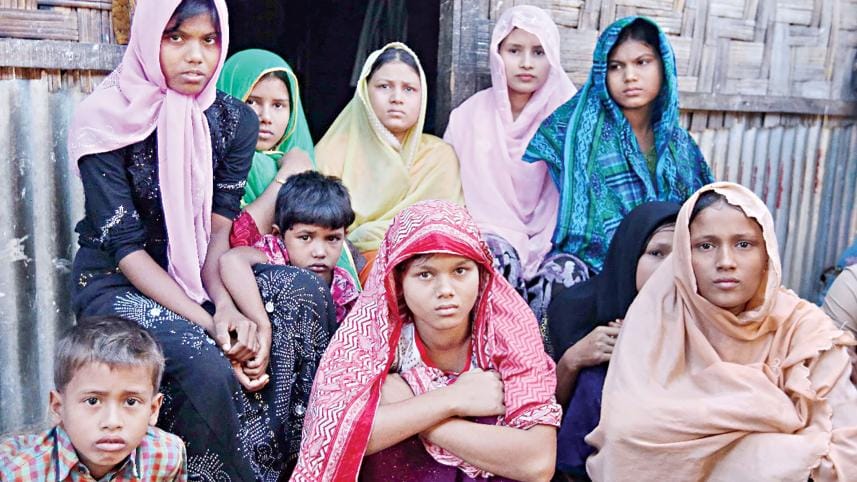
"Once we start menstruating, we're told to cover our heads and stay inside," she said.
Though NGOs offer literacy clubs, many families do not allow girls to attend.
Currently, 26 women's groups meet regularly across Blocks E, F and G, reaching 390 Rohingya women. They discuss leadership, rights and family decision-making.
"Earlier, husbands didn't support these sessions," said Kismat. "But after separate sessions with them, now they do. Now we know -- we won't let our children marry early."
According to RWE programme officer Habiba Nasrin Moni, the transformation has been striking. "In the beginning, they wouldn't even step outside -- they'd just peep through the curtain. Now, they speak confidently, attend regularly, and even give speeches on International Women's Day."
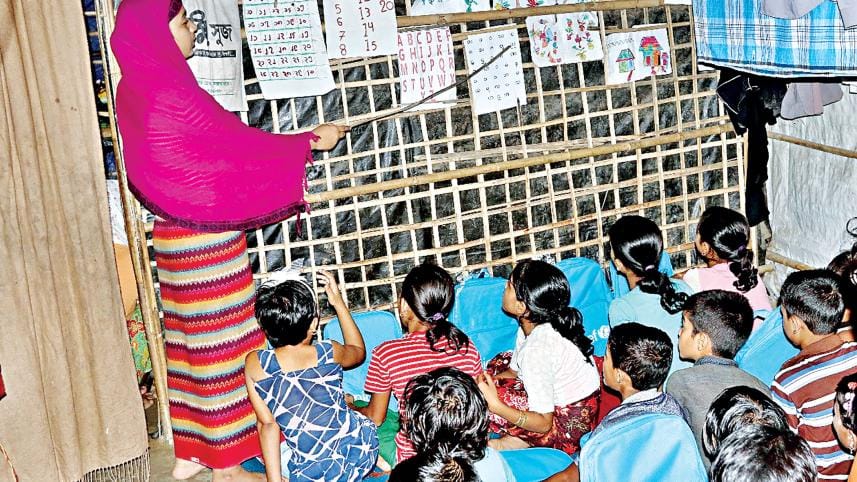
But she warned that "training without tools leaves women stuck. They need materials and seed funding to apply what they've learned, she said.
Community leaders also notice the change. "Families are more aware of early marriage, domestic violence, and including women in decision-making," said Salim Majhi, elected leader of Block E.
BNPS project coordinator Md Shafiqul Islam Faraji said many women could not use their training due to lack of support. "There was a funding issue, but we've addressed it in the extension phase. The necessary materials are expected to be delivered soon."
Outside the camp, the impact of modest support is already visible.
In Samitipara Union, Sabina Banu (not her real name) now runs a tailoring business alongside a grocery shop. Married at 15 to a man twice her age, she was left in debt after he squandered her savings. She eventually divorced him, but he later forced their daughter into early marriage.
"I reported him to the police," she said. "They helped me rescue my daughter. Now she's back in school. My parents married me off under pressure... I won't let that happen to my daughter. I have no dream left for myself -- she is my only dream."
Others are moving ahead too. Widowed Sheuly Begum launched a small cake-making business after a short course and a Tk 10,000 seed fund. "I'm managing... but to grow, I need more capital," she said.
In Alley 6, Priyanka Dhar began tending a small plot and raising poultry after livestock training. "I just want to raise my daughters with dignity," she said.
For women like Asma, Kismat and Sabina, the path forward remains fraught with poverty, patriarchy and uncertainty. But for the first time, it is no longer invisible. Once silenced, their voices now drive change -- reclaiming power, one meeting and one fearless decision at a time.




 For all latest news, follow The Daily Star's Google News channel.
For all latest news, follow The Daily Star's Google News channel.
Comments